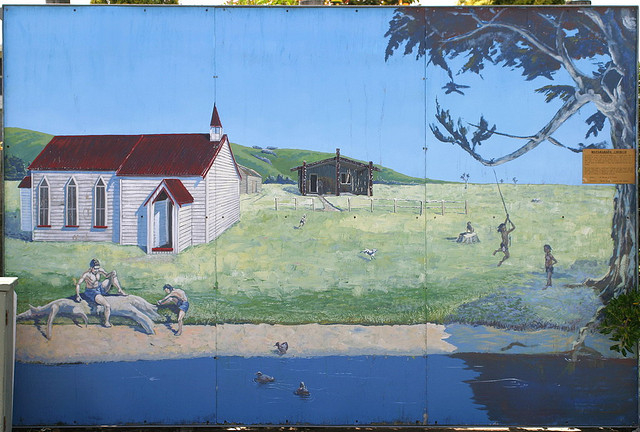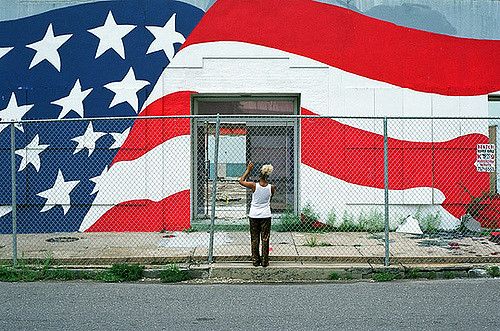As much as I love New Zealand, it has been increasingly difficult to ignore disturbing strands within the dominant Pakeha (European) culture here. As a liberal British import to the land also known as Aotearoa, having traversed half the globe to another democratic first world country with a proud progressive history, I expected a similar level of tolerance as that which I had encountered in my former home, London.
Disappointingly, after several years of considering the issue, I have ended up with the strong impression that this is not the case.
One of the first shocks I received about local racism occurred when I read about the notorious “Kiwi or Iwi” billboard paid for by the National Party (a New Zealand version of the UK’s Tories, probably the biggest and most powerful in the country) on my second visit, in 2006. The images on the posters depicted the face of then-Prime Minister Helen Clark under the heading “Iwi” (a Maori word which means people or “nation”, and is often understood as “tribe”) and the national candidate under the word Kiwi. These were erected in 2005, and intended to stoke fears that the incumbent Labour Prime Minister would privilege Maori interests over those of the white majority, especially where it came to controversial issues such as those associated with Maori claims on the foreshore and seabed.
The message of the billboards were deeply poisonous: dividing the country between “us and them,” implicitly using the term “Kiwi” (usually meant to signify all New Zealanders) to denote an ethnically normative white majority as defined against a Maori minority, who had an agenda that was against the interests of ordinary people. It served the purpose of both attempting to frighten Pakeha, and alienate a minority who had become a target for white resentment during a time when various Iwi were making successful legal claims for breaches of the Treaty of Waitangi.
In this way, the National Party had indulged in a calculated act of invidious racism, bordering on outright incitement- a move that I was disappointed to find out drew only mild criticism from the national media. It was only later that I was introduced up-close to the ugly attitudes held by conservatives. In one particularly unpleasant example, when I started sharing a house with two young men, I was shocked by their constant references to Maori as “niggers.” When I challenged them on this point, I was told that as a “Pommie” I just didn’t know “what [Maori] were like.” They were firmly convinced that the Maori are a monolithic cultural bloc incapable of honesty or trustworthiness. “Honestly, if you spend time with them, they’ll steal your shit. Find out if you want, bro,” I was earnestly informed.
A former boss of mine, who worked for the council in Christchurch, informed me that he deplored the “revisionist” histories of those who depicted Maori as victims of European colonialism, adding for good measure that “they used to eat people you know.” It was an especially astonishing statement, considering how common-knowledge it is that the arrival of Europeans devastated the Maori, plunging their population into dramatic decline until the 20th century.

Gradually, certain popular caricatures of Maori became familiar – depicted variously as work-shy benefit cheats, natural-born criminals or revanchist savages hell-bent on extorting the state. Such opinions were expressed casually by white Kiwis in pub conversations or at work (with the opinionator often assuming that I’d agree with them.) I stress that these were the views of a vocal minority. However, they were disturbing enough.
Interestingly, when I worked as a door-to-door sales representative for various charities in Christchurch, I found myself struck by how it was that Maori were consistently the most generous. By contrast, Pakeha, particularly in the well-off suburbs, were the least responsive to appeals to their conscience, many of them self-professed Christians.
One can choose for themselves the criteria by which they define cultural “inferiority” (if they do at all – hopefully they do not.) Nevertheless, if compassion and openness is to be a factor, then judging by the sample I encountered, I know what impression I got.
Racism in the Media
As time went on, I also became aware of a high level of acceptance of bigotry in the media. Encountering racism in this arena was, if anything, more of a shock then the previous examples, because at least I could attribute the prejudice I encountered to the deficient mindset of a minority. The main offenders were two middle-aged white men – the hugely popular TV personalities Paul Henry, and his namesake, the late Paul Holmes.
Until the time of his suspension and subsequent resignation over a remark about New Zealand’s Governor-General, Henry was the chief presenter of TVNZ’s breakfast news show. He remains one of the country’s most celebrated broadcasters. Among Henry’s “greatest hits” collection of controversial statements are his description of the singer Susan Boyle as “retarded,”his view that homosexuality is “unnatural,” his suggestion, while working in Australia, that asylum seekers “should starve to death” and a series of racist remarks.
Among the latter was his reference to an Indian minister Sheila Dikshit, during the 2010 commonwealth games as “the dip shit woman” and “Dick Shit,” adding that “it’s so appropriate, because she’s Indian, so she’d be dick-in-shit wouldn’t she, do you know what I mean?”
During the controversy over his statements about the Governor-General (he had asked the Prime Minister live on his show, whether Sir Anand Satyanand, a lifelong Aucklander of Indian descent, was “even a New Zealander”,) it turned out that TVNZ was still promoting the notorious “Dikshit” clip on its website. Worse still, in the midst of the firestorm over Henry’s comments, about half of those polled expressed support for him.

One of the least controversial, but no less egregiously racist comments Henry made on his show, was his reference to Muslims wanting “to take over the world.” There was little public outcry, perhaps because it was relatively mild by Henry’s standards. But, I suspect, it was also most likely due to the fact that Islamophobia has become the most socially acceptable form of bigotry in English-speaking countries. Imagine public reaction if the broadcaster had same the thing said about other local minorities, such as Jews , or the Chinese.
Mr Holmes, likewise, was subjected to little opprobrium after making derogatory comments about Islam. With characteristic crassness, he described the practical utility of a Burqa in “ the countries where Islam reigns,”which “stalled in their development several hundreds of years ago,” and are thus typically insanitary places where the body-covering “helps keeps your clothes cleaner for longer.”
This was a preface to the broadcaster’s argument, (in the same article,) that those who wear the Burqa in New Zealand are effectively stating, “I am not part of your filthy heathen community. I’m here enjoying all of the privileges the enlightened West can provide, but I don’t really approve of you all and have no desire to be part of you.” The fact that a middle-aged New Zealander, of European descent, with little or no in-depth experience of the culture he attacks, drew little media controversy, was painfully instructive.
It gets worse. As though to underline the ideological company he keeps, in 2001, Holmes made comments about the Muslim world on a radio show which were cited with approval on Stormfront forums. He also famously called Kofi Annan a “cheeky darkie.” Though Holmes issued an apology afterwards, astonishingly, he was allowed to keep his job.
Not to be undone, Holmes decried the “hopeless failure of Maori to educate their children and stop them bashing their babies” in an article published in the prestigious New Zealand Herald. In the same piece, whose subject was the Waitangi day national holiday, he riled against “hate-fueled weirdos who seem to exist in a perfect world of benefit provision” (a poorly-articulated but unmistakable reference to Maori who protest on the anniversary of the treaty, utilising the classic image of the group as lazy and reliant on welfare.)
Continuing in his polemic, Holmes evinces the target of his ire: “ As I lie in bed on Waitangi morning, I know that later that evening, the news will show us irrational Maori ghastliness with spitting, smugness, self-righteousness and the usual neurotic Maori politics, in which some bizarre new wrong we’ve never thought about will be lying on the table.” Holmes goes on to bemoan the perceived tendency of Maori of blaming “whitey” for everything, while ignoring their own social problems: “ Never mind the child stats, never mind the national truancy stats, never mind the hopeless failure of Maori to educate their children… No, it’s all the Pakeha’s fault.”
While his piece was a breathtakingly crude and partial fulmination of the most self-referential kind, I was dismayed to discover that a large number of New Zealanders had expressed support for Holmes’ polemic, condemning the “politically correct” backlash it invited.
A Reluctant Diagnosis
Reluctantly, I’ve come to realize that such viewpoints are commonly held by many New Zealanders – although far from a majority. It’s now impossible for me to be able to tell myself that the prejudice on display in this country is no worse than in the UK, which certainly has pockets of concentrated bigotry. The truth is, it is worse, and by some margin. The level of tolerance is just that much higher in the media and on the street than it is back home – an apparent fact attested to by a television poll of the New Zealand public, which indicates many Kiwis view the country as being racist.
Having acknowledged this, and without wanting to suggest that the majority of New Zealanders are indeed xenophobic (I genuinely don’t believe they are – and the poll was in response to an on-air debate, not conducted to the standards to a professional pollster’s operation,) I’d like to conjecture about the root cause of the prejudice I have encountered.
New Zealand is a nation dominated by the descendants of a European settler-colonial community used to a tough, self-reliant way of life as newcomers. In societies where large numbers of foreigners have displaced the indigenous people, and historical injustices are disappeared into the memory hole, certain attitudes tend to reproduce themselves, partly in order to deal with suppressed guilt.
Typical among these – for me most immediately recognizable in extremis among white South Africans and rightist Israeli Jews – is the notion that the oppressed are irretrievably backward and somehow deserving of both their plight and their status as de facto second-class citizens. The values and characteristics honored by the invading society – in the case of New Zealand, hard work, self-sufficiency and a no-nonsense attitude – become the criteria by which the supposedly hostile “other” are to be collectively negatively defined.
Thus, the indigenous people are characterized by an inversion of the qualities that are attributed to the dominant society and subject to distorting, derogatory projections. These develop into the commonly-shared rationalizations that bolster automatic prejudices and enforce popular narratives that ward off painful self-reflection- i.e. about the reality of abusive settler-colonial impositions on the lives of native peoples.
These views tend to become diluted as time goes on and new, more liberal generations replace the older ones, as one can see is the case in New Zealand. However, they have considerable staying power nonetheless, as entrenched culturally reproduced attitudes tend to stick around, long past their expiration date.
Such an impoverished parochiality, inherited from previous generations, may be dying out, as the times change and a new Aotearoa divests itself of its most prominent bigots. Yet, while a residual racism towards Maori lingers, its cancerous effects cannot be denied. Confrontation, and tolerance, are its only cure. It’s time for New Zealand to take a stand, and stamp out the colonial legacy of its founding.
Photographs courtesy of Squiggle, Emily Davidow & Phillippe Leroyer. Published under a Creative Commons license.





